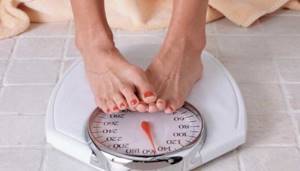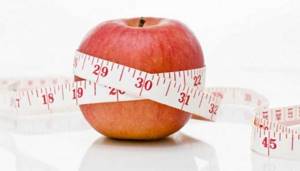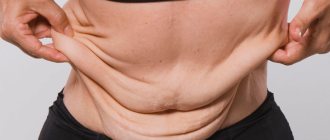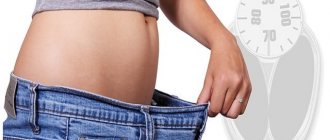The number of calories consumed plays an important role during weight loss. Therefore, it is very important to be able to calculate your daily intake taking into account physical activity.
Nutritionists recommend: to lose weight, it is enough to subtract 200-250 calories from your daily intake and add physical exercise.
This is quite enough to start losing weight. But many people think that 200 calories is too little to lose weight, and they begin to cut their diet by 500, and sometimes by 1000 calories.
But a small problem arises: the weight does not go away, and even to some extent begins to grow. What's the problem? There are at least 5 answers to this question.
Metabolism begins to slow down
The further a person wants to move away from his weight and get rid of fat, the more his body begins to protest. This in turn makes the energy system work more efficiently.
Mitochodria are the source of energy for cells. When the power grid starts to ramp up, they begin to produce a lot more energy from a small amount of fuel input.
At the same time, metabolism begins to slow down. The amount of energy that the body expends during habitual activities is significantly reduced. It even reduces the thermic effect that occurs when burning calories to digest and assimilate food.
The more fat a person loses through a large calorie deficit, the greater the chance of gaining it all back over time.
If you frequently subject your body to such a test, it will learn to conserve energy and minimize calorie expenditure. And this can even contribute to gaining extra pounds.
Reason #4: Metabolic Adaptation

Metabolism knows how to adapt to changing conditions. This is one of the main biological reasons for stopping weight loss. How to deal with this phenomenon?
Metabolism is a “hodgepodge” of four components: TEF – the thermic effect of food, BMR – basal metabolism, EAT – training thermogenesis and NEAT – non-training thermogenesis.
Basal metabolism is responsible for all processes occurring in the body: information processing, breathing, eye movement and even turning the head. About 70% of incoming calories are spent on this.
The lower the weight, the less energy-intensive it is to maintain normal functioning. Many do not take this into account, continuing to eat 1,700 kcal per day, although the norm has long dropped to 1,500.
Non-exercise thermogenesis is physical activity that is in no way related to training in the gym or the so-called “household” calorie consumption. Walking the dog, jogging after a departing train, and typing at the computer require about 30% of your daily calorie intake.
Training thermogenesis is self-explanatory - it's the calories burned during exercise. In this case, energy consumption depends on the type of load and time. Here I have some surprising news: you spend about 15% of your total calories on exercise. It is impossible to “use up” all the cakes and pastries that you ate during the day in one lesson. This is a mistake many people lose weight make. By purchasing a gym membership, a person automatically begins to eat more. Don't do this - keep an eye on your KBZHU balance.
The body also spends calories on digesting food - about 5%. As in the case of basal metabolism, the dependence is directly proportional: less food means less energy consumption.
Having changed your diet, “live” with it for a month - during this time it will become clear whether you need to recalculate your daily calorie intake downward or not.
Leptin – satiety hormone
During weight loss, fat cells begin to decrease in volume. This provokes the production of the hormone leptin, which is responsible for satiety.
Many studies have shown that a large calorie deficit will lead to a sharp drop in levels of this hormone. And this will negatively affect the rate of burning fat reserves.
Even after weight stabilization, the level of the hormone will remain in the blood for several weeks. This means that after finishing the diet, it will be very difficult to get full, and the constant feeling of hunger will become a real provocateur and test.
Why am I not losing weight
Unfortunately, the vast majority of people face a similar problem.
Nowadays there is generally an exception, I think, when a person decides to start losing weight, begins to eat less, and BAM, he loses weight.
Basically, things are not so rosy.
This usually happens like this: a person begins to eat less, initially the process of losing weight goes quite quickly, then the weight loss slows down, and then stops completely.
To all attempts to further reduce kilocalories, the body responds with a lethargic state, bad mood, decreased mobility, slow reaction and metabolism.
Let's start simple.
We need to focus on just TWO components:
- Intake of kilocalories.
- Kilocalorie consumption.
And if with the arrival of calories everything is quite simple. We can easily calculate quite accurately how much we ate and what we ate in a day, but with consumption it’s not so fun.
Our bodies have a huge number of different adaptation mechanisms that have been developed over millennia so that our ancestors could survive in the harsh outside world.
We will not talk about all the mechanisms within the framework of this article (this is not necessary), we will only talk about those that can interfere with weight loss.
Ghrelin is a hunger hormone
It's not just leptin levels that change during a large calorie deficit. This type of diet causes the body to actively produce ghrelin.

An increase in this hormone can cause a person to constantly feel hungry and find it very difficult to get enough. But at the same time, the body will retain additional energy, which will turn into an excellent source of weight gain.
Important! High levels of ghrelin will not lead to weight loss, but to weight gain.
A little about what I'm living now
Guys, before moving on to the main topic of the article, I’ll tell you a little about what I’m living now, and why I haven’t published articles for some time.
So, as you remember, I recently released a product for gaining muscle mass. Damn, it turned out to be so detailed and effective.
Clients are satisfied, there is positive feedback, we continue to work on their questions and goals.
I’m telling you this so that you don’t scold me too much for not publishing new articles for a couple of weeks.
There is some kind of fatigue and emotional “squeeze” inside, or something. I put a lot of effort into releasing that very course.
I will improve)
I myself really like to release new materials and communicate with you in the comments and social networks.
Now I will try to release more relevant materials about weight loss, because... at the end of February/early March the blog will release a new cool course about weight loss. I am sure this course will make a huge impression on all readers.
Well, the second thing that took quite a lot of time and effort was writing training and nutrition programs for clients. I am trying more and more to work with clients, because... this gives me the opportunity to understand more and more interesting situations and help people progress, and secondly, this is, of course, monetary motivation.
Now I have to work hard to move forward towards my goals. But, of course, I won’t forget the blog. On the contrary, in the near future there will be a lot of sensible articles about bodybuilding, weight loss, and productivity.
Well, now, to the topic of the article.
Impatience
A large calorie deficit still produces results. If a person has tried this method for the first time, he will be able to evaluate good results after several days of eating according to the new regimen. From such success, he naively begins to believe that the effect will last for a long time.
As a result, disappointment sets in after 5-7 days. And he begins to drink as he did before the diet.

Water retention
Diet and training are stressful for the body, because... we spend energy, and consume less than we spend (this is the basis for any diet).
Add stress at work or school to this, your loved one has left you, your period has arrived, your children won’t let you sleep, and so on.
It turns out that there is a load (training + external stress from other activities) and we do not receive enough food (diet). All this leads to an increase in the body’s production of the stress hormone – CORTISOL!
The bad thing is that cortisol RETAINS FLUID IN THE BODY. Because of this, it seems to us that we are not losing weight, although we limit ourselves completely in everything!
The body is still puffy, although the fat is disappearing (but we don’t see it), and this again causes stress. It turns out to be a vicious circle.
Conclusion: YOU NEED TO CALM DOWN and stop being nervous.
There is no need to go on a diet when you have problems in life and severe depression. You either won’t lose weight, and there’s also a risk of injuring yourself in the gym.
Try to choose the most stable period of time for your diet.
Here's what will help reduce your stress levels:
- Relaxation and meditation. Sometimes it helps to just sit down, open the window, close your eyes and start listening to your breathing. I sometimes manage to take a few minutes to just collect my thoughts. Moreover, science has proven the positive effect of such procedures.
- Walking and walking. Yes, this also helps a lot to cope with stress. Just take an unfamiliar route, walk through a park or forest. This often helps a lot.
- Massage. Massage has been proven to significantly reduce stress levels, and therefore cortisol. I noticed this in Thailand, when Ksyusha and I went for a massage almost every day. Such relaxation and tranquility.
- Sex. I don't think there's much to explain here. Sex really helps to switch very well. As they say: “Only animal sex makes you feel human.”
- Write something in a notepad. Or notebooks. Or on a piece of paper. Keep records. This helps a lot. When we write something on paper, our brain focuses on it and records it. This helps in achieving what you want.
- Make a refeed. When you are on a diet for a long time, the body adapts to constant restrictions, especially severe ones, and stops responding. Refeed for 2 weeks. Add calories from carbohydrates (20-40% carbohydrates). This will reduce stress and drain excess water.
Why do you gain weight after dieting?
The set amount of fat we talked about above is determined by the number and size of your fat cells. When you stop dieting, the shrinking fat cells become larger again. In theory, this should tell the body that the weight has been restored and there is no longer a calorie deficit, so you can stop saving energy.
However, the experiment Weight regained after sustained weight reduction is accompanied by suppressed oxidation of dietary fat and adipocyte hyperplasia. proved in mice that rapid weight restoration after weight loss provokes the formation of new fat cells.
The more fat cells you have, the smaller their average size. Lack of fat cell size and reduced leptin levels signal to the body that the amount of fat is still reduced, so your body continues to conserve energy. All this causes you to accumulate even more fat than before the diet.
It turns out that in order to really lose weight, you need to avoid a sharp slowdown in metabolism during the diet and properly return to your normal diet after it. Let's look at three strategies that will help you lose weight without slowing down your metabolism and get back on track without gaining fat.











